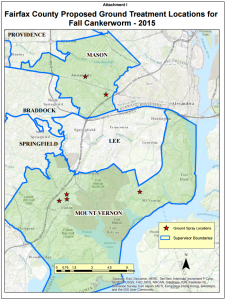WASHINGTON – With clocks set to spring forward this weekend, and the snow set to melt, Fairfax County is turning to its bug spraying plans for the spring, including one that has proven to be controversial.
The Board of Supervisors approved plans Tuesday to spray for cankerworms, or inchworms, over 66 acres in the Mt. Vernon, Lorton, Annandale and Alexandria areas, despite the objections of Mt. Vernon District Supervisor Gerry Hyland.
“We don’t know that it will result in the death of a tree, because we have no evidence that that has been the case. But we feel that the cankerworm may, by defoliating the tree, cause possibly a problem for the tree in the future at some point, but we’re not sure?” Hyland asked the Forest Management Division’s Troy Shaw.

“Trees’ response to defoliation is very, very complicated. It may be that trees that are in poor health will succumb to a pressure such as defoliation right away. But more often than not, it will take a number of years and possibly other factors that will cause the trees to die,” Shaw said.
The spray program will cover about 200 properties this year, including some large ones, but property owners can opt out of the spraying. Any impacted homeowners or renters are supposed to get information through the mail, but concerned property owners can also contact the county’s Forest Pest Branch.
Hyland pressed that no one has asked the county to spray this year, but he has received a lot of complaint letters “from just about every organization that is concerned with the environment…all of which are saying this is the wrong thing to do.”
They say it is a native bug that nature can take care of.
“I just don’t think that this is necessary and (it) does not enjoy the support of the people who are closest to this issue,” Hyland says.
Supervisor Penny Gross says she has seen older trees in parks dying, and she believes steps like this spray program are important.
“We’ve noticed our trees being stressed over time by weather, by both cold weather and hot weather, by hurricanes, by derechos. They don’t always just go over the first time. It’s an accumulation over time that kills the tree,” Gross says.
“This is preventative medicine, it’s the kind of thing that we would do for ourselves to make sure that we’re not letting something take over in the body, and so I truly think that this a good approach, it is a restricted approach. It is ground spraying, it is not aerial. It will be very, very focused,” she adds.
The pesticide used against cankerworms is effective against moths and butterflies, so any larvae or caterpillars exposed during the three to ten days that the pesticide is on the trees could also be impacted. The pesticide is destroyed by ultraviolet sunlight and is also washed off by rain.
Gross says she is happy that the area being sprayed this spring is smaller than in year’s past. The area is based each year on surveys of how many of the pests there are, and where the bugs are in the county.
A separate county program is designed to contain ticks and mosquitoes to cut down on the risk of West Nile virus or Lyme disease, and Fairfax County Board Chairwoman Sharon Bulova says all the programs are important to protect trees or residents.
“There was a time in Fairfax County when the biggest issue was the gypsy moth infestation, and trees being defoliated, and I think we’ve come a long way in being able to treat trees for various different pests, and to prevent widespread defoliation like we’ve had in the past,” Bulova says.







